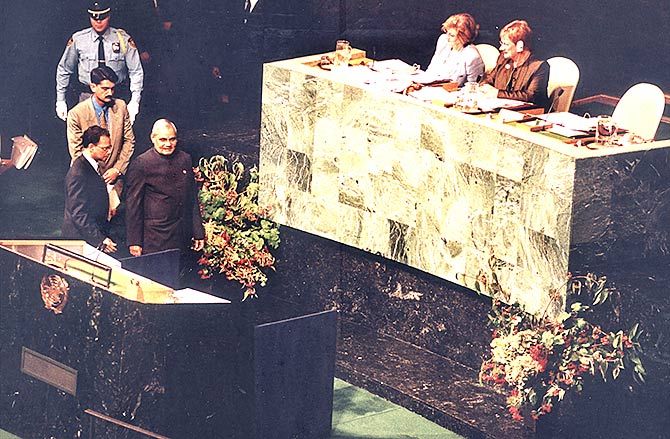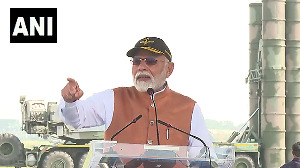'In India foreign policy is generally handled by the prime minister.'
'One can clearly see the Vajpayee stamp on all this.'
'Only a person with poetic imagination can weave such a complex web,' says Colonel Anil A Athale (retd).

- Part 1: The nuclear tests: Vajpayee's finest hour
- Part 2: Mending fences, making friends
- Part 3: Vajpayee, the war-time prime minister
On December 13, 2001, terrorists attacked the very citadel of the Indian State, Parliament.
It was a culmination of the acts of terror that India had been facing since the 1980s. The source of funds, manpower and weapons and ideological motivation for these attacks lay in Pakistan.
It was at this juncture that Atal Bihari Vajpayee, the forever man of peace, showed the steel in him. He ordered the cutting off of all links with Pakistan and ordered the deployment and mobilisation of India's might against Pakistan to fight the final war.
The operation was named 'Parakram' by the armed forces.
Speaking in Parliament, Vajapyee clearly spelled out the war's aim, to make Pakistan give up hostility towards India.
Implicit in this assertion was the loophole of escape for Pakistan that should it change its policy, war may not take place. This put the onus on Pervez Musharraf, Pakistan's military dictator, to break with terrorists.
India's actions put enormous pressure on Pakistan.
In the aftermath of 9/11, the US and the Western world was not prepared to accept terrorism in any garb.
India was also subject to economic pressure by the West which ordered the evacuation of its personnel from India and put in jeopardy the booming IT industry. All this was calculated to restrain India.
It appeared that the pressure on Pakistan was working and war could be avoided. But in the midst of this crisis came the attack on the women and children of army personnel in May 2002.
War now seemed inevitable.
Intense American diplomacy and a promise by Musharraf to India conveyed by Richard Armitage, then the US deputy secretary of state, in June 2002 avoided an outbreak of war.
The Americans not just conveyed the message but virtually guaranteed Pakistani good behaviour.
Invested with American power and prestige, India accepted the promise and shelved the impending war.
There was indeed some let-up in the terrorist violence and as the monsoon progressed the fear of war receded.
In October 2002 elections were held in Kashmir and tensions began to cool down. India then announced that it was recalling its troops from the border.
Vajpayee's 3rd peace initiative
Just when the world was tiring of Indian insistence of an end to cross-border terrorism as a precondition for peace in the subcontinent, Vajpayee sprang a surprise in April 2003 when he offered a hand of friendship to Pakistan. He made it clear that this was his third and final attempt.
Soon thereafter, he set in motion a train of events that led to restoring people-to-people contacts, communication links and even sporting ties.
All this while he built sufficient pressure on Pakistan to ensure that peace prevailed in Kashmir and elsewhere in India. The efforts were crowned by his visit to Islamabad in December 2003 and beginning of talks in February 2004.
Juggling major powers
The foregoing discussion has been heavily biased in favour of the events in the Indian subcontinent. That is unjust to Vajpayee as he is the first Indian prime minister to have 'realistically' played a global role.
Jawaharlal Nehru indeed did, but it was a role not backed by economic or military strength and it came a cropper in 1962.
The major breakthrough in Indian foreign policy came after Pokhran II with talks between Jaswant Singh and Strobe Talbott. At that time, and even later, this was called a 'sellout'. There was a fear that India was becoming a camp follower of the US.
Alarmed at this prospect, the then Russian prime minister Yevgeny Primakov floated the idea of a Russia-China-India axis to oppose the uni-polar world.
The first triangular relationship that India constructed was the India-US-Israel axis.
Liberated from the knee-jerk anti-Israel tendency, this relationship is on a firm footing to counter political Islam and jihadi terrorism.
India has secured tangible gains in terms of state of the art weapons from Israel (with American blessings) and also made sure that the US does not supply military hardware to Pakistan.
This has resulted in India being able to get the better of the terrorists in Kashmir and also maintain an edge in conventional arms over Pakistan.

The second triangular relationship that evolved over two to three years was among India-Iran-Russia. This in a way is complementary to the first one as all three countries are victims of 'Wahhabi Islam'.
The Russian headache of Chechenya is well known. Also, the Russian fears of spread of Islamist ideology in Central Asia are very real as there is a large presence of Russians in the Muslim majority country of Kazakhstan.
Shia Iran had been a staunch supporter of Pakistan. So much so that in the 1965 War it sheltered Pakistani aircraft and even supplied it with arms and spares.
But thanks to growing anti-Shia pogroms in Pakistan and the Taliban nightmare in Afghanistan, Iran has come to value Indian moderation and friendship. The reported India-Iran defence co-operation would have been unthinkable a few years ago.
India is also acting as a bridge between the US and Iran. Since this relationship helps the US fight Islamist forces in the Middle East and also has the potential to help it out of the Iraq quagmire, it enjoys quiet American backing.
The third triangular relationship that has developed is among India, China and Brazil. At the recent WTO conference the trio successfully thwarted the developed world's efforts to foist an economic regime that would hurt the agricultural economies of the developing countries. This is one relationship that is purely economic and has no direct security dimension.
Yet, by standing up to the West, including the US, India has demonstrated that it is no camp follower of the West.
There is one more interesting development that could have far reaching consequences. This is the alliance among India, US and Japan.
For long Japan acted as an American proxy in Pakistan and worked against Indian interests. While the Japanese have been making large investments in India and also earning good profits, Japan has been singularly hostile to Indian security concerns.
With the imminent rise of China to superpowerdom and Chinese proxy North Korea's threatening posture, Japan seems to be finally waking up to an Indo-Japanese alliance.
Japanese technology married to Indian skills and resources can be the most effective counter to the Chinese desire to dominate Asia.
In India foreign policy is generally handled by the prime minister himself. One can clearly see the Vajpayee stamp on all this. Only a person with poetic imagination can weave such a complex web.
Colonel Anil A Athale (retd) is currently co-ordinator of the Pune-based Initiative for Peace And Disarmament affiliated with the Bharatiya Vidya Bhavan.






